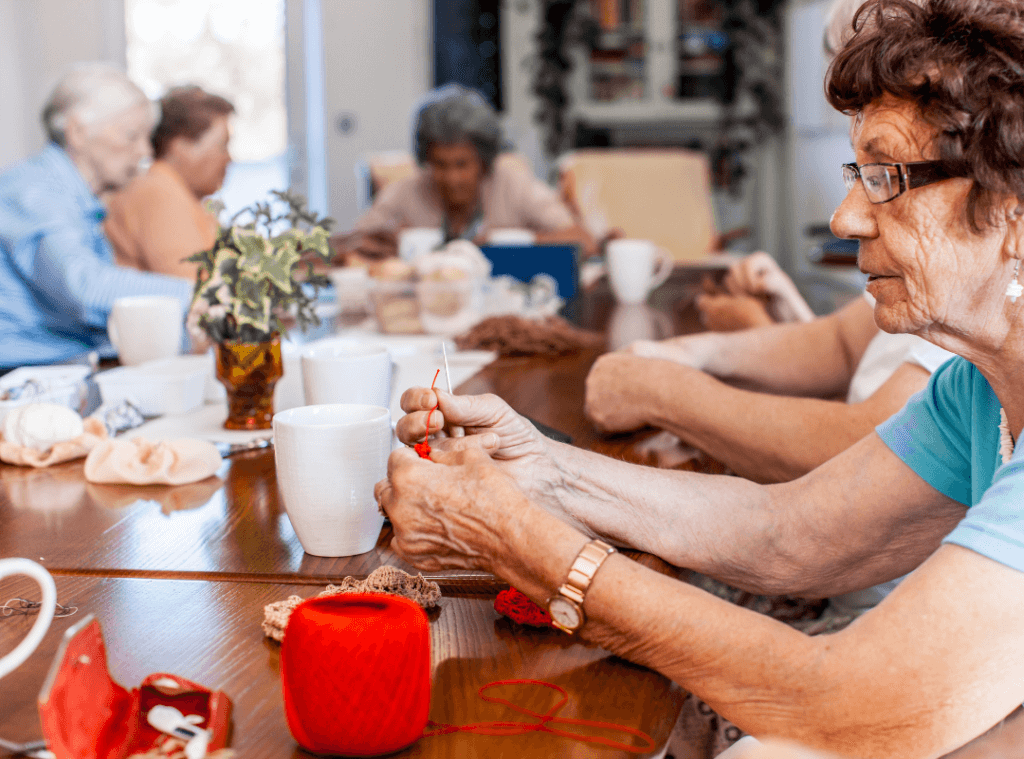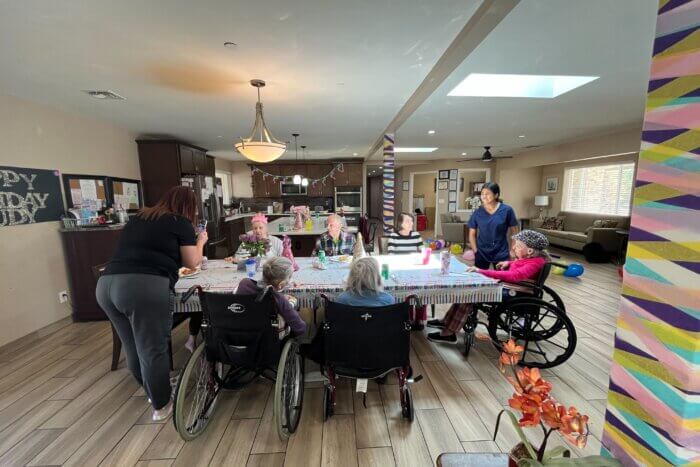Top Activities for Vision-Impaired Elderly to Enjoy Daily

Engaging activities for vision-impaired elderly are more than just pastimes—they’re a gateway to improved emotional well-being, connection, and daily joy. At MD Senior Living, we specialize in crafting meaningful experiences that empower seniors with visual impairments to live rich and fulfilling lives.
From sensory games and music therapy to aromatherapy and nature-based adventures, we believe in solutions that go beyond routine care. These carefully selected activities for blind seniors are tailored to stimulate all senses, promote independence, and encourage personal expression. Let’s explore how you can help your loved ones thrive with thoughtful engagement and support.
For full community offerings, visit MD Senior Living.
Tactile Games That Boost Cognitive Function
Interactive games for blind seniors offer a blend of fun, challenge, and connection. These tactile games enhance both sensory and cognitive stimulation:
- Textured card games with raised patterns or Braille
- Sensory puzzles using familiar household items or unique textures
- Board games adapted with audio instructions or large-print labels
These hands-on experiences aren’t just entertaining—they provide emotional stimulation and a sense of accomplishment. Residents at MD Senior Living have the opportunity to explore these activities in a supportive environment where engagement is key to thriving.
To explore activities for blind people near you, consider checking with local senior centers or visually impaired support groups for tailored resources.
Music Therapy: A Soothing Journey Through Sound
Music is one of the most powerful hobbies for blind people, as it transcends visual limitations. Soothing music sessions bring joy, nostalgia, and emotional relief. These curated sessions may include:
- Gentle instrumentals or classical compositions
- Nature-inspired soundscapes like rain or birdsong
- Familiar oldies that trigger happy memories
- Interactive drumming or rhythm exercises
Music therapy also enhances focus, reduces stress, and fosters meaningful social connections. At MD Senior Living, we believe in the healing power of melody. Read more about the benefits of music in senior care here.
Looking for music-based activities locally? Try community music circles or organizations like Music & Memory, which provides personalized playlists for seniors with cognitive or sensory challenges.
Creative Crafting: Expression Through Touch
When it comes to hobbies for blind people, few activities compare to the joy of creating something with your hands. Creative crafting allows seniors to:
- Work with clay, yarn, or tactile fabric
- Create textured collages or memory books
- Decorate raised-letter greeting cards
- Explore adaptive art tools such as audio-described craft kits
These expressive activities not only stimulate the senses but also help seniors feel connected to themselves and others. Art becomes a universal language—regardless of sight. Explore more on accessible crafting for seniors here.
Sensory-Rich Outings: Reconnecting With Nature
A simple walk in a garden can transform the day of a vision-impaired senior. Sensory-rich outings engage every sense and reconnect individuals with the outdoors:
- Touch: Trees, grass, stones, or flower petals
- Sound: Birds chirping, leaves rustling, fountains flowing
- Scent: Fresh herbs, wildflowers, ocean breeze
- Taste: Fruits harvested from a local garden
These excursions help residents feel present, peaceful, and grounded. According to Verywell Mind, nature can improve mood, reduce anxiety, and promote physical activity—all essential for aging individuals.
Discover how outings benefit senior health on MD Senior Living’s blog: Getting Outdoors Can Do Wonders.

Aromatherapy: Elevating Emotional Well-Being
Another highly effective form of therapy for visually impaired seniors is aromatherapy. Fragrance is deeply tied to memory and emotion. Here’s how to use it:
- Lavender for calming sleep
- Peppermint for boosting alertness
- Citrus oils for a refreshing, energizing effect
- Eucalyptus for respiratory support
You can diffuse oils in common areas, add them to towels, or even incorporate them into massage sessions. Each scent becomes a form of comfort and self-care. Personalizing aromatherapy to each resident’s preferences adds emotional warmth to their routine.
Learn how social wellness and scent go hand-in-hand: Social Wellness for Seniors.
Therapeutic Crafting: A Mindful Experience
Incorporating therapeutic crafting into daily routines allows visually impaired seniors to slow down and enjoy the moment. Consider activities such as:
- Pottery therapy: molding clay by hand
- Knitting or crocheting: soothing, repetitive actions
- Beading with large tactile materials
These mindful practices improve focus, reduce stress, and encourage patience. The key is to let participants explore freely—there’s no right or wrong when it comes to creativity.
These also serve as enriching activities for blind seniors who enjoy structure combined with artistic freedom.
Occupational Therapy: Encouraging Confidence and Independence
Occupational therapy is instrumental in building life skills and supporting independence for seniors with low vision. This includes:
- Learning safe kitchen practices using tactile tools
- Labeling medications and personal items with Braille
- Practicing self-care with adaptive techniques
- Navigating rooms and halls with guided practice
Through gradual training and personalized support, seniors can regain control over daily tasks. Occupational therapy transforms frustration into freedom and fosters empowerment.
Explore tools like talking scales or color-identifying devices—ideal for those seeking functional support for everyday routines.
Making These Activities Accessible
Looking for activities or programs for blind people near you? Here’s where to begin:
- Local senior centers and retirement communities often host inclusive group programs
- Libraries for the blind offer audiobooks, Braille classes, and hobby circles
- Nonprofits like Hadley and the American Foundation for the Blind provide remote courses and support tools
Remember, it’s not about what they can’t do—but what they love to do differently.
Let’s Create Joy Together
Enriching the lives of seniors starts with intention and care. From games for blind seniors to nature walks and music therapy, these activities for vision-impaired elderly unlock purpose, joy, and connection.
At MD Senior Living, we’re committed to delivering compassionate care paired with creativity and inclusivity. Whether you’re searching for local programs or considering a supportive living environment, we’re here to help you every step of the way.
📞 Call us today at 480-418-9150 or visit our Contact Page to schedule a Tour and discover how we help every resident feel seen, heard, and celebrated.
Frequently Asked Questions
What games are good for the elderly with low vision?
Elderly individuals with low vision can enjoy a variety of games designed to stimulate the mind and provide entertainment. Tactile board games such as large-print Scrabble, dominoes with raised dots, and tactile chess are excellent choices. Card games with oversized print or Braille cards also work well. Additionally, audio-based games and group trivia activities ensure they remain socially engaged while still having fun.
What crafts can the visually impaired elderly do?
Visually impaired seniors can take part in crafts that emphasize touch, texture, and creativity rather than detailed visuals. Knitting, crocheting, and loom weaving are popular activities since they rely on repetitive hand motions. Clay sculpting, pottery, and tactile painting with raised outlines also provide rewarding experiences. These crafts not only encourage creativity but also help improve fine motor skills and relaxation.
What are the best exercises for the visually impaired?
Visually impaired seniors benefit from safe, accessible exercises that enhance strength, balance, and mobility. Walking with a guide, chair yoga, and gentle stretching are excellent low-impact options. Strength training with resistance bands or light weights can be done with minimal vision, focusing on guided movement and muscle control. Group fitness classes designed for low vision or audio-guided exercise programs can also keep seniors active while reducing the risk of falls.





Leave a Comment